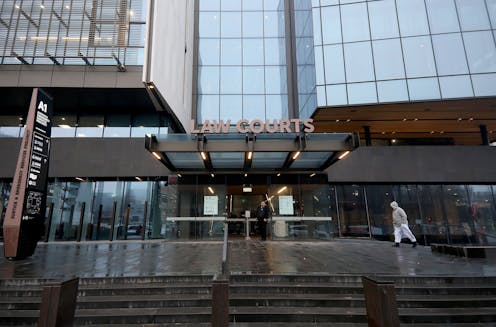NZ's hate speech proposals need more detail and wider debate before they become law
- Written by Eddie Clark, Senior lecturer, Te Herenga Waka — Victoria University of Wellington

Promised changes to New Zealand’s hate speech regulations have been slower to emerge than first anticipated. But a recently released cabinet paper[1] finally gives some idea of what is being considered.
The proposals were originally intended[2] to be made public by late 2019 in the aftermath of the Christchurch terror attacks. In the end, it took until December 2020 for the matter to get to cabinet.
The delay, however, meant officials and ministers had the report[3] of the royal commission of inquiry into the attacks (released in November 2020) to guide them.
The resulting proposals pull in two different directions: on one hand tightening definitions of what qualifies as hate speech, on the other significantly broadening the categories to which it can apply.
What the law says now
New Zealand currently has no comprehensive hate speech laws. The closest are provisions within section 21 of the Human Rights Act 1993[4] which prohibit incitement of racial disharmony.
These make it a criminal offence for a person to publicly use language which is “threatening, abusive, or insulting” to a group of people on the basis of their “colour, race, or ethnic or national origins”, and which is intended to “excite hostility or ill will against, or bring into contempt or ridicule” that group.
This is punishable by a fine of up to NZ$7,000 or up to three months imprisonment.
Read more: The gender gap in Australia’s hate speech laws[5]
The Human Rights Act also contains a civil liability provision[6] allowing individuals to complain to the Human Rights Commission about incitement of racial disharmony. Unlike the act’s criminal provisions, this doesn’t require intent — it focuses only on the likely effect of such incitement.
A complaint to the Human Rights Commission might involve its mediation services in the first instance, but can also result in the matter being referred to the Human Rights Review Tribunal.
If the tribunal upholds the complaint, it can offer a variety of remedies[7], including ordering a person to cease the offending speech, undertake training or pay monetary damages.
What the proposed reforms would do
As part of its broader recommendations to promote social cohesion, the royal commission suggested some reasonably narrow changes[8] to the existing Human Rights Act provisions:
- add incitement of disharmony on the basis of religion
- move the criminal offence to the Crimes Act 1961[9] and increase the penalty
- tighten the definitions within the provision.
The proposals in the cabinet paper would do all this, specifically increasing the punishment to a fine of up to $50,000 or maximum of three years imprisonment. This would put hate speech punishment in the same general league as making a false declaration[10] or assault with intent to injure[11].
The language would also be revised to make it an offence to intentionally “stir up, maintain, or normalise hatred” against a nominated group through “threatening, abusive, or insulting communications, including inciting violence”.
This is narrower than the existing law, meaning speech intended to bring a group into “contempt or ridicule” would no longer be covered.
Read more: We tracked antisemitic incidents in Australia over four years. This is when they are most likely to occur[12]
Where the cabinet paper goes significantly further than the royal commission is in its recommendation the new law be extended beyond race and religion to cover all categories protected under section 21 of the Human Rights Act. These include age, sex, disability, religion, race, sexual orientation, political opinion and a number of others.
The paper also proposes a similar expansion of the civil provision in the Human Rights Act (largely ignored by the royal commission), and adding a prohibition on incitement of discrimination.
It also proposes clarifying the grounds of discrimination to specifically include gender identity and sex characteristics.
A risk of over-reach
By and large, this is a measured proposal. The threshold for criminal liability is very high, requiring a high degree of animosity and an effect far beyond offending an individual.
Despite some claims[13] to the contrary, the proposed laws would not cover (for example) the unkindness and rudeness implicit in casually mis-gendering a trans person.
But by including every ground of discrimination under section 21 of the Human Rights Act, there is some risk the proposed changes become overly broad. In particular, political opinion is an area in which robust, even hostile, debate is important, and there is potential for a “chilling effect”.
Reasonable people may well disagree on this and other aspects of the proposal. But at this stage the cabinet paper is just that — a set of proposals. A more detailed discussion document will be put out for public consultation. One would hope it will include a more precise draft of the proposed legislation.
Hate speech regulation is a fraught topic with important considerations on all sides. It deserves serious consideration and public debate before these proposals finally become law.
References
- ^ cabinet paper (www.justice.govt.nz)
- ^ originally intended (www.nzherald.co.nz)
- ^ report (christchurchattack.royalcommission.nz)
- ^ section 21 of the Human Rights Act 1993 (legislation.govt.nz)
- ^ The gender gap in Australia’s hate speech laws (theconversation.com)
- ^ provision (www.legislation.govt.nz)
- ^ a variety of remedies (www.legislation.govt.nz)
- ^ reasonably narrow changes (christchurchattack.royalcommission.nz)
- ^ Crimes Act 1961 (www.legislation.govt.nz)
- ^ making a false declaration (www.legislation.govt.nz)
- ^ assault with intent to injure (www.legislation.govt.nz)
- ^ We tracked antisemitic incidents in Australia over four years. This is when they are most likely to occur (theconversation.com)
- ^ some claims (web.archive.org)













